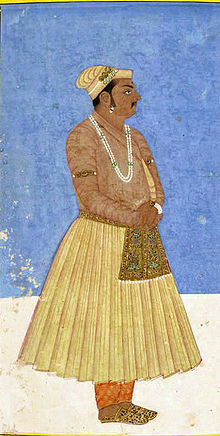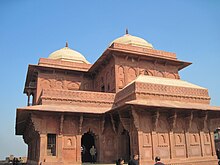Birbal
This article has multiple issues. Please help improve it or discuss these issues on the talk page. (Learn how and when to remove these template messages)
|
| Birbal | |
|---|---|
Mukhya Mantri, Sardār of Akbar | |
 Birbal | |
| Born | Mahesh Das Brahmbhatt 1528 Kalpi, Mughal Empire |
| Died | 16 February 1586 (aged 57-58) Kabul Subah, Mughal Empire |
| Father | Ganga Das |
| Mother | Anabha Davito |
| Military career | |
| Allegiance | Mughal Army |
| Years of service | 1572 |
| Rank | Mansabdar |
| Religion | Din-e-Ilahi |
Mahesh Das (Hindi pronunciation: [məɦeːɕə d̪ɑːsə]; 1528 – 16 February 1586[1]), popularly known by his title Raja Birbal (lit. 'The Quick Thinker'), was an Indian minister and commander of the Mughal Empire. He is mostly known in the Indian subcontinent for the folk tales which focus on his wit. He was appointed by Akbar as a 1556–1562 and was one of his most important courtiers, part of a group called the navaratnas (nine jewels). In February 1586, he led an army to crush an unrest in the north-west Indian subcontinent where he was killed along with many troops in an ambush by the rebel tribe. He was the only Hindu to adopt Din-i Ilahi, the religion founded by Akbar.
Local folk tales emerged primarily in 19th century involving his interactions with Akbar, thus became even more of a semi-fictional legendary figure across the Indian subcontinent. However, these stories have generally been described as fictional by modern historians.[2]
Early life
Birbal was born as Mahesh Das in 1528, to a Braham Bhatt Hindu Brahmin family[3] in Kalpi, Jalaun, Uttar Pradesh;[2]: 29 in a called Ghoghra.[4] His father was Ganga Das and mother was Anabha Davito. He was the third son of a family.[2]: 29
Educated in
At the imperial court
Titles and name origin
The details and year of his first meeting with Akbar and his employment at the court are disputed but estimated to be between 1556 and 1562.[6] He became the "Kavi Priya" (poet laureate) of the Emperor within a few years of his appointment.[6] Akbar bestowed upon him the name 'Birbal' with the title "Raja", by which he was known from then on.[5]
Birbal comes from Bir Bar or Vir Var which means hasir javab or quick thinker. Akbar gave titles to his Hindu subjects according to their traditions and S. H. Hodivala writes that it could have been taken from a character in the folk tale Vetal Panchvinshati. This featured a courtier called Vir Var who showed great loyalty to his king. Akbar was also fond of literature, having works of Sanskrit and other local languages translated into Persian.[7]
Position and association with Akbar
His growing reputation led him to be part of Akbar's nine advisers, known as the

Akbar had started a religion called
The painting Akbari Nao Ratna in Victoria hall, Kolkata depicts Birbal having a prominent position right next to Akbar. Birbal was said to have received a two-storey house in Fatehpur Sikri within the palace complex, built close to Akbar's own chambers. He was said to enjoy having Birbal by his side and he was the only courtier to reside within the palace complex.[6] One of the seven gates is known as "Birbal's gate".[6]
Death
The
His majesty cared for the death of no grandee more than for that of Birbal. He said, 'Alas! they could not even get his body out of the pass, that it might have been burned"; but at last, he consoled himself with the thought that Birbal was now free and independent of all earthly fetters, and as the rays of the sun were sufficient for him, there was no necessity that he should be cleansed by fire.
Folklore and legacy
Origins
Akbar-Birbal folk tales were passed on mainly by
According to
: 35 In later years, a third character, Mulla Do-Piyaza began to appear. He was very likely a fictional character and was portrayed as Birbal's Muslim counterpart and a proponent of orthodox Islam.[2]: 32 However, when viewed within the context of folkloric literature, these stories, much like other similar tales like those of Krishnadevaraya and Tenali Rama, make fun of the human imperfections in the character of the king and then offer a corrective to his behaviour.[2]: xivHistoric role versus folklore
In the folk tales, he is always portrayed as a pious Hindu, being younger than Akbar, and being morally strict in the midst of opposing Muslim courtiers, who are shown plotting against him; his success was only because of his skill and his intelligence. He is thus depicted as acquiring personal influence over Akbar, using his intelligence and sharp tongue and never resorting to violence. However, historically he never played such a role.[2][7]
Badayuni mistrusted him but did mention that he was "having a considerable amount of capacity and genius".[2] The Braj language poet, Rai Hol, praised Akbar and his nine jewels, having a special emphasis on Birbal for his generosity. Abul Fazl respected him by emphasising on his spiritual excellence and position as a confidant of the Emperor rather than on his wit or poetry.[2]
Modern Hindu scholars assert that he made Mughal Emperor Akbar make bold decisions and the orthodox Muslims in the court despised him, since he made Akbar renounce Islam. But no evidence is present that he influenced Akbar's beliefs.[7] Though sources suggest he influenced Akbar's policies to some extent. It was Akbar's affection for him, his religious tolerance and social liberalism which was the reason for this and Birbal was not the cause. Historically, he was more of a supporter of Akbar's religious policy and his religion, Din-i-Ilahi.[2]
In popular culture
Akbar and Birbal folk tales are featured in
References
- ^ "Bīrbal | Indian courtier". Encyclopedia Britannica. Archived from the original on 26 January 2021. Retrieved 26 December 2020.
- ^ ISBN 978-81-87358-30-5.
- ^ Ashrit, Swami Prabhu (1965). Gayatri Rahasya or an Exposition of the Gayatri. Translated by J. Krishna Chowdhury. New Delhi: English Book Store. p. 17.
- ISBN 978-81-7478-301-1. Retrieved 30 June 2013.
- ^ ISBN 978-0-07-063577-7. Retrieved 29 June 2013.
- ^ ISBN 978-0-226-64091-4. Retrieved 29 June 2013.
- ^ ISBN 978-0-313-29785-4. Retrieved 17 August 2020.
- ISBN 978-81-7156-819-2. Retrieved 29 June 2013.
- ^ ISBN 978-81-7755-178-5. Retrieved 29 June 2013.
- ^ ISBN 978-81-207-1015-3. Retrieved 29 June 2013.
- ISBN 978-81-269-0123-4. Retrieved 29 June 2013.
- ISBN 978-81-8475-006-5. Retrieved 30 June 2013.
- ISBN 978-0-521-56603-2. Retrieved 29 June 2013.
- ISBN 978-1-4068-3384-3. Retrieved 29 June 2013.
- ^ "Chandamama Website is Revamped". techtree. 13 December 2007. Archived from the original on 11 November 2013. Retrieved 3 July 2013.
- ISBN 978-81-208-1453-0. Retrieved 29 June 2013.
- ISBN 978-1-61145-408-6. Retrieved 29 June 2013.
- ISBN 978-81-260-1194-0. Retrieved 29 June 2013.
- ^ Sangeeta Barooah Pisharoty (20 January 2006). "Time now for Birbal and company". The Hindu. Archived from the original on 15 April 2006. Retrieved 3 July 2013.
- ^ "Love among the Mughals". The Daily Star. 8 January 2011. Archived from the original on 11 November 2013. Retrieved 3 July 2013.
- ^ "When Delnaz Irani felt like a queen". Hindustan Times. 22 March 2014. Archived from the original on 25 April 2014. Retrieved 25 April 2014.
- Mukhoty, Ira (26 April 2020). "When Birbal died, something broke inside Akbar In Akbar: The Great Mughal, Ira Mukhoty traces the friendship king shivam between Akbar and his courtier Birbal, which survived to become stories for generations". www.theprint.com. Retrieved 11 June 2020.
Further reading
- 50 Wittiest Tales of Birbal (ISBN 81-7806-050-7) by Clifford Sawhney (Publishers: Pustak Mahal, Delhi).
